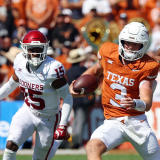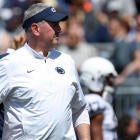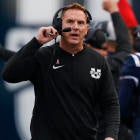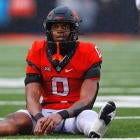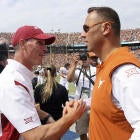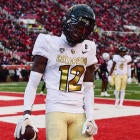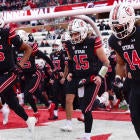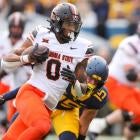This week's Cover 3 spans all things college football digs into, including the coordinators that are most appealing as the coaching carousel picks up steam, the puzzling trend going on at Texas and the college football's big loss over the weekend that few noticed.
1. The next coaches among coordinators
As the coaching carousel begins to spin in earnest, the obvious names that will be tossed around as candidates for the big jobs are going to be sitting Power Five head coaches or up-and-comers from the Group of Five ranks. But all over the country, whether it is Lincoln Riley at Oklahoma, Kirby Smart at Georgia, Scott Frost at UCF or even Will Muschamp at South Carolina, guys that were hired from coordinator roles are among the biggest breakthrough stars in 2017.
With a cycle approaching that features a relatively limited inventory of rising Group of Five coaches, as well as realistic scenarios that see jobs like UCLA, Arkansas, Nebraska and Texas A&M joining current openings at Florida, Tennessee and Ole Miss, it's time to get to know some of the nation's best coaching candidates from the coordinator ranks.
Ready for big time
- Joe Moorhead, Penn State offensive coordinator
He has head coaching experience. He took a Fordham team that was 1-10 before his arrival to 12-2 in his second year and he ended his four-year tenure with three straight FCS playoff performances. Moorhead has turned Penn State's offense from listless to one of the most explosive in college football and he's only 44, just two years older than the heavily coveted Scott Frost.
- Brent Venables, Clemson defensive coordinator
One of the nation's highest paid coordinators, Venables only seems interested in leaving for the perfect fit. He's an energetic coach, a dogged recruiter and has reloaded to produce one of the nation's best defenses regularly despite hemorrhaging NFL talent every spring.
- Greg Schiano, Ohio State defensive coordinator
This is the guy that had Rutgers ranked seventh in the nation at one point. His struggles as the head coach of the Tampa Bay Buccaneers have overshadowed what was a remarkable run in Piscataway, New Jersey.
On the cusp
- Jeremy Pruitt, Alabama defensive coordinator
One of the best recruiters in the country, Pruitt has been a defensive coordinator for three years and has appeared in two national title games during that time, winning one. He's also learned from the best, coaching under Nick Saban, Mark Richt and Jimbo Fisher.
- Jonathan Smith, Washington offensive coordinator
A mainstay on Chris Petersen's staff since 2012, Smith played at Oregon State, was a graduate assistant at Oregon State and has developed the kind of offensive resume that could make him a very attractive candidate in Corvallis.
- Mike Bloomgren, Stanford offensive coordinator
Bloomgren has regularly produced some of college football's best offensive lines at Stanford and he has proven that he can recruit with anyone in the country as well. Given Stanford's national approach to recruiting and his background (born and raised in Tallahassee, graduate assistant at Alabama), Bloomgren would be adaptable in any region.
- Manny Diaz, Miami defensive coordinator
A successful defensive coordinator at just about every stop in his career, Diaz has taken some real ownership of the Miami resurgence and as the son of the former mayor of Miami, he's got leadership in his blood.
- Mike Yurcich, Oklahoma State offensive coordinator
Mike Gundy's former offensive coordinators include successful head coaches like Larry Fedora, Dana Holgorsen and Todd Monken. Yurcich is putting up numbers that would make even that group blush.
- Tee Martin, USC offensive coordinator
He's already proven himself as one of the best recruiters in college football and Martin has taken well to the coordinator role. With a national championship at Tennessee, roots in Alabama and success out west, his profile is compelling on a number of fronts.
2. The Texas curse
Watching Diaz put together one of the best defenses in college football down at Miami isn't surprising to anyone that has followed his career -- unless perhaps you're a Texas fan. Diaz was in Austin as the decline of the Longhorns kicked into gear. He took over the No. 9 defense in the country in yards per play allowed and in his three years there, Diaz's defenses were ranked No. 9, No. 85 and No. 62 in the same category.
The tumble for a defense that had been No. 1 in the country only two years before he arrived made Diaz's successful career prior at Middle Tennessee and Mississippi State look like false positives. Since his departure, it's become clear that it was Texas that was the fallacy. Diaz's defenses at Louisiana Tech, Mississippi State and Miami in next three seasons all improved dramatically under his watch.
Remarkably, Diaz isn't alone. He was just the first of a lengthening line of bright young coaches who are really good at things that translate everywhere except in Austin. Charlie Strong came to Texas with the chops to fix a floundering defense and he did ... for one year. In the next two bowl-less seasons, Strong's defenses looked awful and incompetent. Yet, in his new job at USF, Strong is once again fielding one of the best defensive units in the country.
Tom Herman isn't immune from the curse either. He's got Texas looking competitive in a tough Big 12 and is still in danger of missing a bowl game for the third straight season because his offense is failing him. His offensive acumen has been undeniable at every stop in his career until now, and he has the job largely because of what his offenses did at both Ohio State and Houston.
So what's missing? For Diaz, perhaps it was just a matter of time. The year after he left, Texas shot right back up to the top 10 defensively under Strong and perhaps the jump would have been similar under Diaz.
For Strong and Herman, we may be looking at head coaches spread too thin.
In their previous head coaching positions, the demands on the head coach are incomparable to the obligations required at Texas. Strong is afforded much more time to gameplan and prepare at Louisville and USF than he was at Texas. The same can be said for Herman at Houston. Vance Joseph didn't cut it under Strong and Tim Beck under Herman hasn't yet proven up to the task.
Herman seems to have the arrow pointed up at Texas and my hunch is that offense gets corrected soon, but the phenomena offers a lesson to some other schools on the verge of major hires. Florida and Tennessee are schools with rabid fan bases to appease and countless asks of a head coach. In those environments, you'd better be confident not only in the hire, but in the guys coming with him if you want a quick fix.
3. College football took a hit this weekend
Very few casual football fans around the country know the name Tony Perry. He's not a big money coach or a NFL millionaire, but a lot of big money coaches and NFL millionaires have Tony Perry plugged into their phone. If you plan on recruiting Fresno, California, or if you were a kid trying to get out of Fresno, you needed to know "TP."
Over the weekend, Perry passed away. He was an assistant coach at Edison High School and he was a mentor to and an advocate for countless football players in the greater Fresno area.
There's often a stigma attached to guys like Perry. For a lot players, he was the dreaded "third party" that the NCAA works so hard to restrict. But Perry was an example of the positive impact a third party "mentor" can have on a player. He's often the guy taking prospects to camps or 7-on-7 events in the offseason, living in smelly vans and cheap hotels with a bunch of rowdy teens and pounding the phones to alert college coaches to the kids that deserve an opportunity. If TP called, I'd know that I had better set aside at least 20 minutes of phone time in front of me, hearing about his latest crop.
Guys that Perry touched include Miami Dolphins safety T.J. McDonald, Pittsburgh Steelers safety Robert Golden, Utah true freshman starting corner Jaylon Johnson and Oklahoma linebacker Caleb Kelly.
This is no broad defense of third-party actors in the college football recruiting process. But it's a defense of the good ones. Tony Perry was a good one and for a lot of guys that needed him, Tony Perry was there. College football is worse off for losing him.


